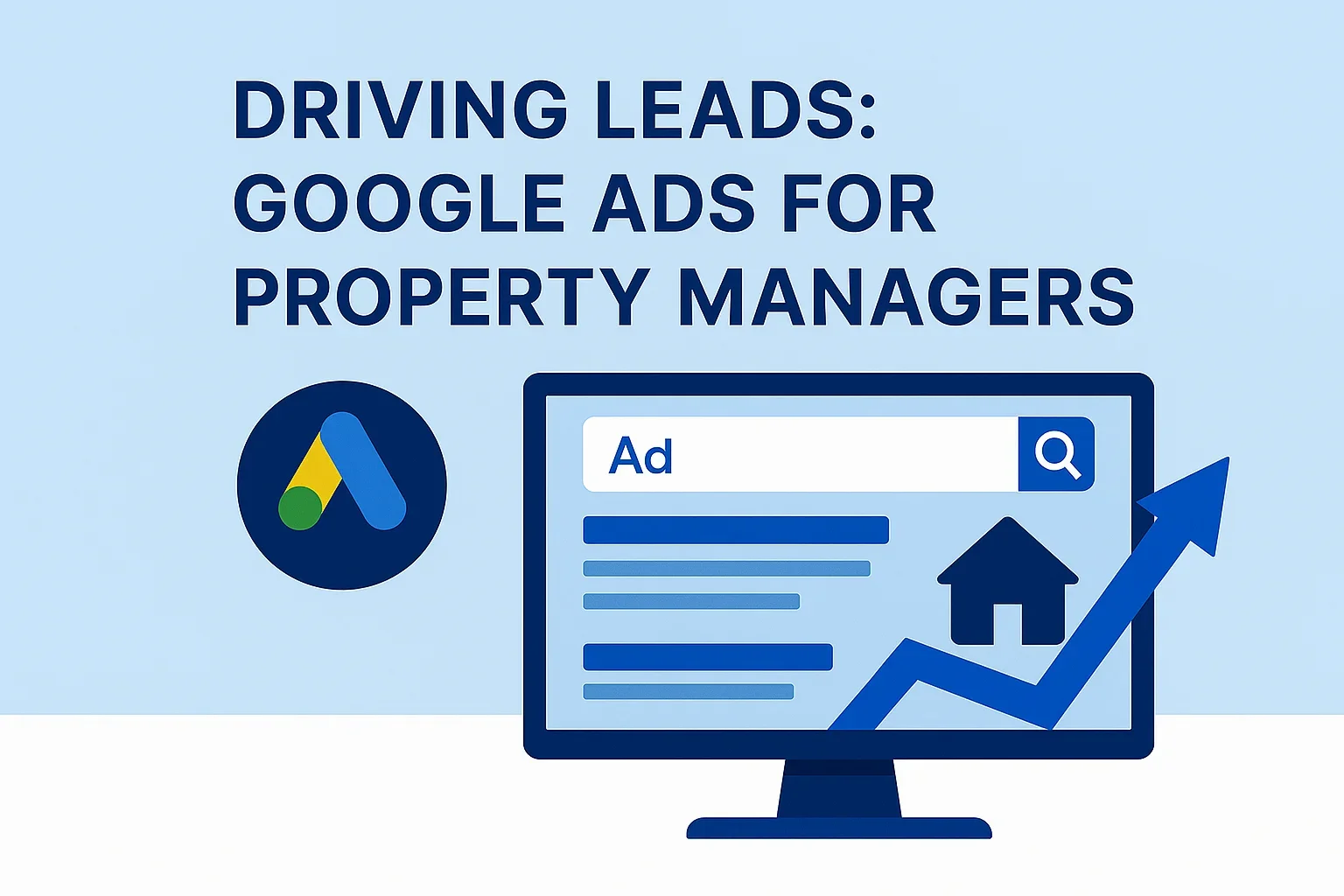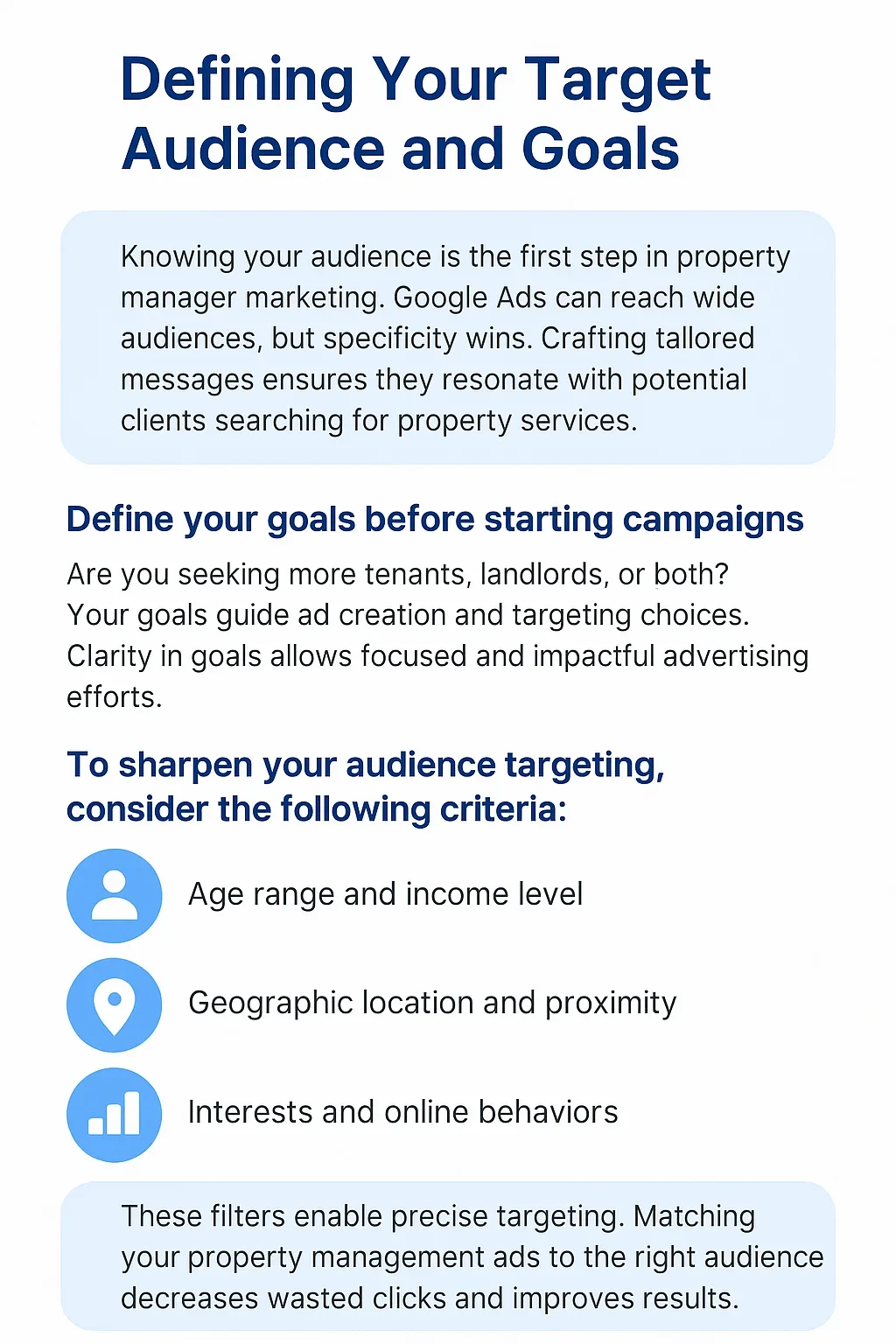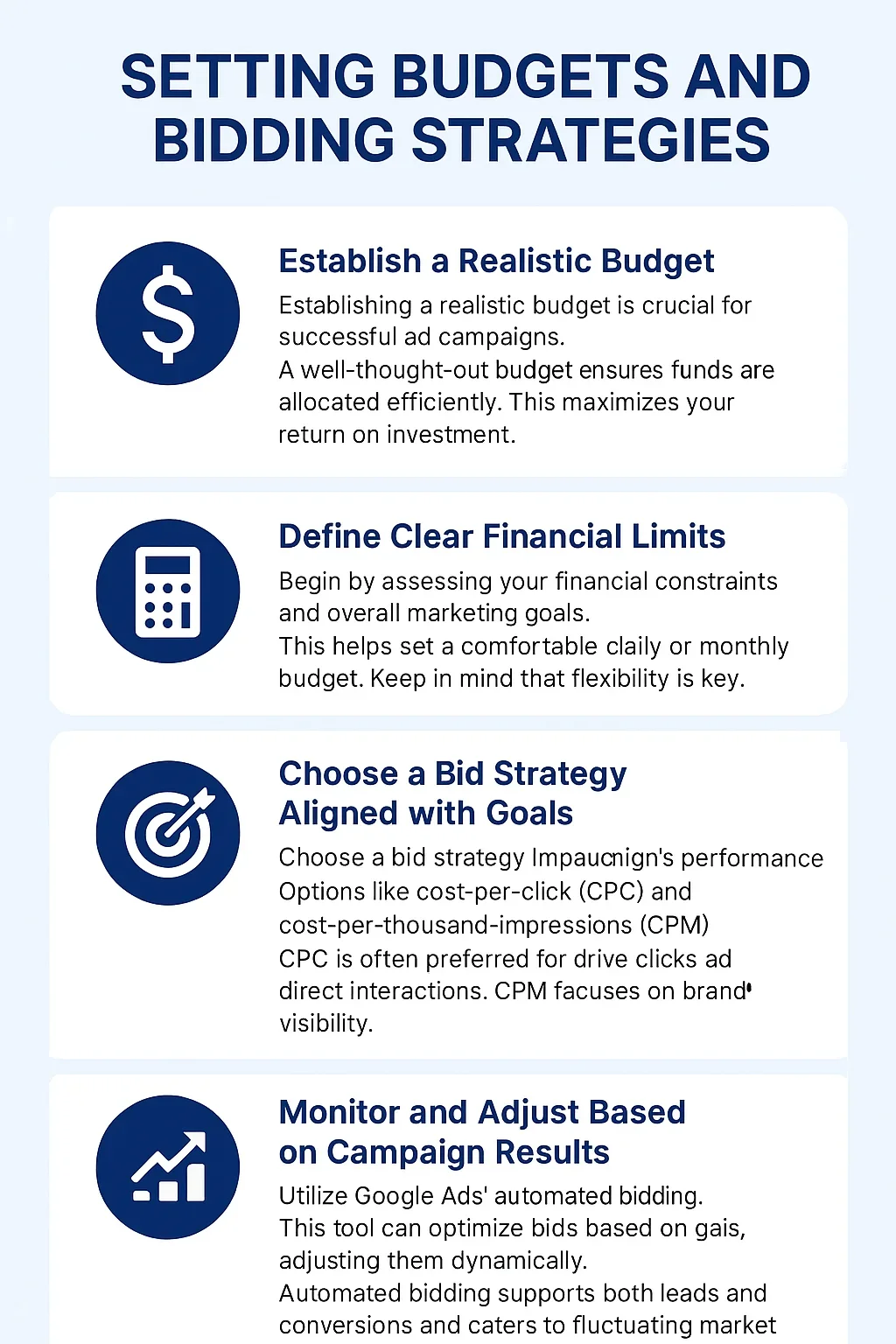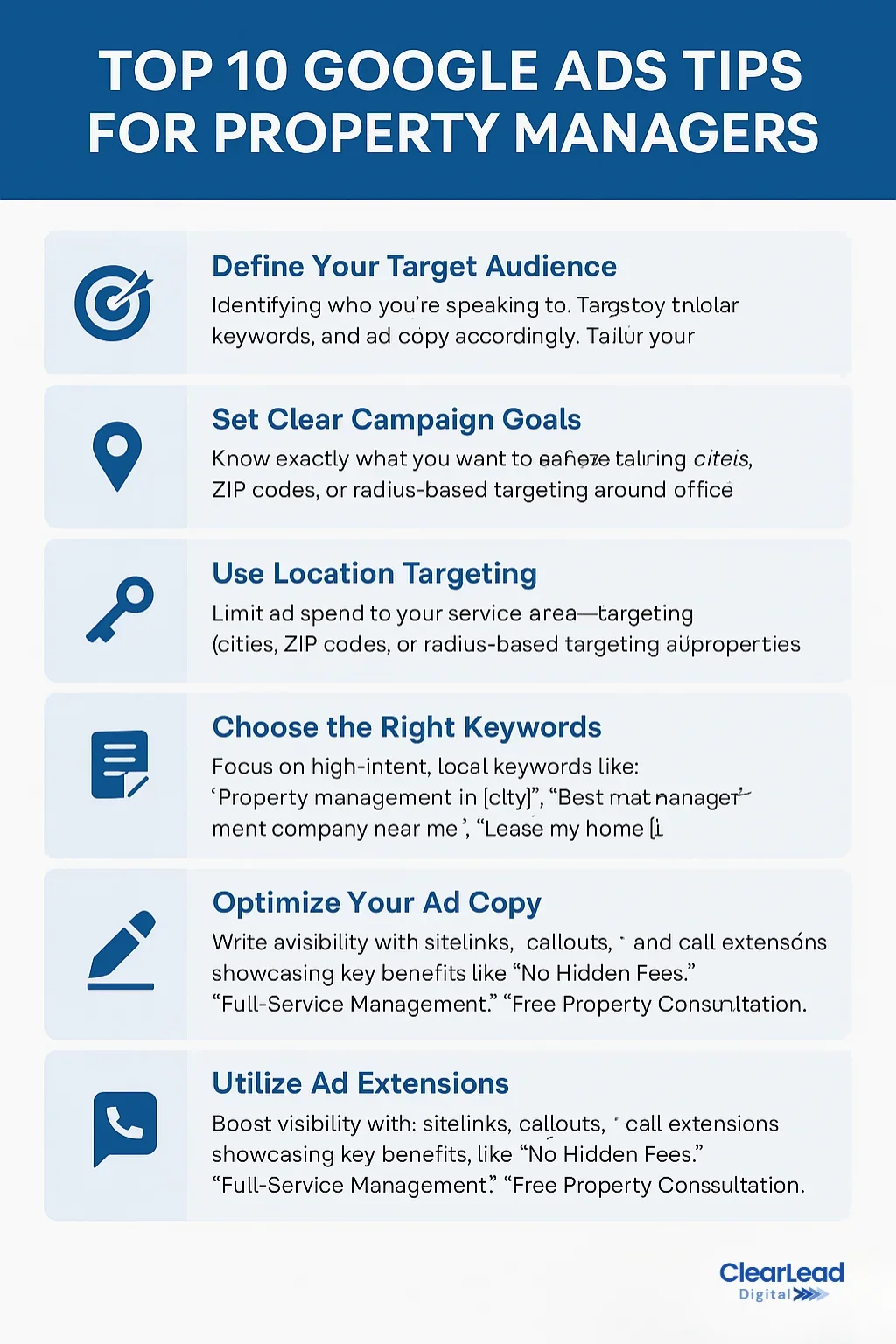Driving Leads: Google Ads for Property Managers
Google Ads is a game-changer for property managers looking to attract more owners, tenants, and leads online. With targeted pay-per-click (PPC) campaigns, you can reach high-intent searchers in your market, boost brand visibility, and maximize your marketing ROI. This guide covers everything you need to know — from audience targeting and keyword strategy to ad copy, bidding, and conversion tracking, to help your property management business dominate search results and generate quality leads consistently.
Table of Contents
Google Ads is a game-changer for property managers. It offers a direct line to potential tenants and clients. In the competitive real estate market, standing out is crucial. Google Ads strategies can help you achieve that.
Real estate PPC is a powerful tool. It allows you to target specific demographics and locations effectively. Understanding your audience is key. It helps in crafting ads that resonate and drive engagement.
Extensive keyword research is the backbone of successful campaigns. It reveals what potential clients are searching for. Ad extensions and A/B testing can enhance your ads. They improve click-through rates and optimize performance.
Setting a realistic budget is essential. It ensures you manage costs while maximizing return on investment. Regular monitoring and adjustments are necessary. They help maintain campaign success and adapt to changing trends.
Why Google Ads Matter for Property Managers
Google Ads is vital for property managers seeking new leads. It bridges the gap between services and potential clients.
Property management ads thrive on visibility. Google Ads ensures your business stands out in crowded markets.
Through Google Ads, you can reach specific audiences. This includes potential tenants searching for properties.
There are several reasons why Google Ads is a must-have tool:
It offers precise targeting to reach desired demographics.
You can effectively manage and optimize your advertising budget.
Google Ads provides data-driven insights for smarter decisions.
It ensures a high degree of visibility, boosting brand awareness.
Property managers compete in ever-changing environments. Google Ads provides a competitive edge by adapting to market shifts.
Additionally, real estate advertising through Google is cost-effective. It aligns your budget with your marketing goals.
In a digital-first world, leveraging Google Ads means tapping into robust advertising channels. This helps in generating quality leads consistently.
Understanding Real Estate PPC and Google Ads Basics
Real estate PPC (Pay-Per-Click) empowers property managers to reach potential clients quickly. Google Ads is at the forefront of this approach, offering unmatched reach and precision.
In PPC campaigns, you pay only when someone clicks your ad. This makes it a cost-effective tool if well-managed. Crucially, it enhances visibility across the web, steering viewers to your listings.
Here’s a basic rundown of how Google Ads function in the real estate sector:
Keywords trigger your ads when searched online.
Advertisers bid on these keywords to secure ad placement.
Ads appear in prominent positions on search results, enhancing visibility.
Campaigns can target specific locations and demographics.
Keyword relevance is vital in PPC campaigns. The right keywords ensure your ads reach the appropriate audience, those actively seeking property services.
Bidding plays a pivotal role as well. Bids decide if your ad appears in high-traffic spots or lags behind competitors. Skillful bidding strategies can stretch a budget further.
Lastly, always keep an eye on PPC metrics. Regular monitoring ensures campaigns stay effective and cost-efficient.
Defining Your Target Audience and Goals
Knowing your audience is the first step in property manager marketing. Google Ads can reach wide audiences, but specificity wins. Crafting tailored messages ensures they resonate with potential clients searching for property services.
Define your goals before starting campaigns. Are you seeking more tenants, landlords, or both? Your goals guide ad creation and targeting choices. Clarity in goals allows focused and impactful advertising efforts.
To sharpen your audience targeting, consider the following criteria:
Age range and income level
Geographic location and proximity
Interests and online behaviors
These filters enable precise targeting. Matching your property management ads to the right audience decreases wasted clicks and improves results.
Lastly, regularly review and adjust your audience settings. As markets change, so too can your potential clients' behaviors and preferences. Adapting quickly to these shifts keeps campaigns relevant and effective in driving leads.
Keyword Research for Property Management Ads
Effective keyword research is the cornerstone of successful Google Ads campaigns. It drives relevant traffic to your property management site. Identifying the right keywords ensures that your ads appear to people who are actively searching for property services.
Start with brainstorming sessions. List terms that potential clients might use when looking for property management. Think beyond obvious phrases like "property management," and consider specific variations. These can help attract a broader audience.
To refine your keyword list, use tools like Google's Keyword Planner. They provide insights into search volumes and competition levels. Balance between high-volume terms and less competitive long-tail keywords to reach niche audiences.
Don’t forget about negative keywords. These prevent your ads from appearing in irrelevant searches. Incorporating negative keywords reduces costs and improves the quality of your traffic. Consider the following:
Generic searches unrelated to property management
Competitor names
Locations you don’t serve
Regularly update and revise your keyword list. Adapting to market changes helps maintain the effectiveness of your campaigns over time.
Crafting Compelling Ad Copy and Creative
Effective ad copy is crucial for capturing the attention of your audience. Your headlines should be clear, concise, and compelling. This draws potential clients in immediately.
Use action-oriented language to inspire clicks. Words like "discover," "explore," and "secure" can motivate people to interact with your ad. Pair this with a strong call-to-action.
Highlight unique selling points that set you apart from competitors. Do you offer 24/7 support? Are your rates unbeatable? Showcase these advantages directly in your ad.
Visual elements are equally vital. Compelling images or videos increase engagement rates significantly. This is especially true for platforms like YouTube. Ensure visuals align with your brand message and target audience.
A/B testing is essential for optimizing your ad performance. Test different headlines, calls to action, and visual components. Use performance data to tweak and refine your approach. Consider the following tips:
Use urgent language to create FOMO (fear of missing out)
Ensure keywords appear naturally within the ad
Focus on benefits rather than features
Compelling ad copy and creative set the stage for higher engagement. This dramatically enhances your Google Ads results.
Setting Budgets and Bidding Strategies
Establishing a realistic budget is crucial for successful ad campaigns. A well-thought-out budget ensures funds are allocated efficiently. This maximizes your return on investment.
Begin by assessing your financial constraints and overall marketing goals. This helps set a comfortable daily or monthly budget. Keep in mind that flexibility is key.
Choosing the right bidding strategy impacts your campaign's performance. Options like cost-per-click (CPC) and cost-per-thousand-impressions (CPM) offer different advantages. CPC is often preferred for drive clicks and direct interactions. CPM focuses on brand visibility.
Utilize Google Ads' automated bidding. This tool can optimize bids based on goals, adjusting them dynamically. Automated bidding supports both leads and conversions and caters to fluctuating market conditions.
Consider these elements:
Define clear financial limits
Choose a bid strategy aligned with goals
Monitor and adjust based on campaign results
Regularly review your spending patterns and bidding effectiveness. This ensures your strategy remains aligned with your marketing objectives. Proper budgeting and bidding can transform your ads' success.
Geographic and Demographic Targeting Strategies
Pinpointing your target audience is vital for effective Google Ads campaigns. Geographic and demographic targeting refines your audience and optimizes ad reach.
Start by analyzing your potential market location. Identify areas where demand for property management is high. Focus on locales with significant tenant or client interest.
Next, dive into demographics. Consider factors like age, income, and family status. These details help tailor ads to specific groups, such as young professionals or families.
Employ tools offered by Google Ads for detailed targeting. Make use of location settings to narrow down by city, ZIP code, or even radius. Demographic settings allow you to target by age range, household income, and parental status.
Key strategies to implement:
Analyze location demands thoroughly
Leverage Google's location and demographic settings
Refine your audience for sharper focus
This approach ensures your ads reach the right people at the right time. Tailoring your campaigns this way can yield better engagement and conversions.
Using Ad Extensions to Boost Performance
Ad extensions enhance Google Ads by providing extra information to potential clients. They can significantly increase ad visibility and click-through rates.
Utilizing ad extensions allows you to communicate more effectively. You can share important details about your property management services. This includes phone numbers, links to property listings, and any special offers.
Consider using various types of ad extensions to maximize impact. Here are some options to explore:
Sitelink Extensions: Direct users to specific pages like pricing or available properties.
Call Extensions: Encourage immediate contact by adding phone numbers.
Location Extensions: Show your business address to attract local clients.
These tools can greatly enhance your campaigns' effectiveness. Ad extensions not only improve interaction rates but also boost your ads' relevance. This enhanced presentation can lead to more qualified leads and increased conversions.
Optimizing Landing Pages for Conversions
A well-optimized landing page is crucial for converting clicks into actual leads. It's where potential clients make decisions, so it must be effective.
First impressions matter. Ensure your landing page loads quickly and is visually appealing. A slow or cluttered page can deter visitors instantly.
Your messaging should be clear and concise. Visitors should immediately understand the benefits of your services and what actions to take next.
Critical elements to include on your landing page are:
Strong Headlines: Grab attention with clear and compelling text.
Call-to-Action (CTA): Make it prominent and easy to find.
Contact Information: Provide options for interested visitors to reach you.
Regularly test and tweak your landing pages based on performance data. This continuous refinement can enhance user experience and conversion rates. By focusing on these elements, you increase your chances of turning ad clicks into valuable leads.
Tracking, Analytics, and Measuring Success
Successful Google Ads campaigns rely heavily on diligent tracking and analysis. Data-driven decisions lead to improved outcomes.
Google Ads provides robust analytics tools such a GA4 Google Analytics. These tools offer insights into ad performance and user behavior. Metrics like click-through rate (CTR) and conversion rate are crucial indicators.
Consistently monitor your campaign's key performance indicators (KPIs). By doing so, you can spot trends and make necessary adjustments for better results.
Essential metrics to track include:
Impressions and Clicks: Indicate reach and engagement levels.
Cost-Per-Click (CPC): Helps manage and optimize budget efficiency.
Conversion Rate: Reflects the effectiveness of your ads in generating leads.
Analyze this data to identify areas of improvement. Doing so helps to maximize return on investment (ROI). Checking and updating your Google Ads plan often helps keep it effective and competitive in the changing real estate market.
Advanced Google Ads Tips for Property Managers
Taking your Google Ads campaigns to the next level involves mastering advanced strategies. These tactics focus on optimizing performance and cutting costs.
Consider using automated bidding strategies. Google Ads offers options like Target CPA and Target ROAS. These features help to optimize your ad spend efficiently.
Another tactic is to use retargeting strategies. By targeting users who've interacted with your website, you can enhance brand recall and conversions.
Here are a few advanced tips:
Leverage Dynamic Search Ads: Tailor your ads based on user search queries.
Use Google Ads Scripts: Automate and streamline repetitive tasks.
Implement Customer Match: Create personalized ads for existing contacts.
By integrating these advanced tips, property managers can elevate their Google Ads campaigns. This will lead to greater success and improved engagement with potential clients.
Common Mistakes and How to Avoid Them
Even savvy marketers can trip up with Google Ads. Avoiding common missteps can make a significant difference in your campaigns.
One frequent mistake is ignoring negative keywords. This oversight can lead to wasted ad spend on irrelevant searches. Regularly update your negative keyword list to fine-tune targeting.
Another error is not setting clear goals. Without defined objectives, measuring success becomes challenging. Establish clear, measurable goals from the start.
Here’s a quick list of mistakes to avoid:
Neglecting to test different ad copies
Overlooking mobile optimization
Ignoring Quality Score improvements
By being mindful of these pitfalls, property managers can optimize their Google Ads campaigns. This will ensure more efficient use of resources and better outcomes.
Staying Ahead: Trends and Updates in Real Estate Advertising
Real estate advertising is ever-changing, with new tools and features frequently introduced. Staying current helps maintain a competitive edge.
Some trends to notice are more use of AI for bidding automatically and the growth of video marketing on sites like YouTube. Innovations in these areas offer opportunities for property managers to capture more leads.
Here's a quick list of emerging trends:
AI-driven automated bidding
Enhanced video ad options
Local service ads expansion
By keeping pace with these trends, property managers can effectively update their strategies. This approach ensures they harness the latest advancements to drive success.
Conclusion: Taking Action with Google Ads
Google Ads offers property managers a powerful way to reach new clients and enhance marketing efforts. With informed strategies and careful planning, you can maximize your ad budget effectively.
By understanding audience needs and leveraging the right tools, you can create ads that convert. The key is to take action now. Experiment with different strategies and continually refine your campaigns to stay ahead. Embrace the opportunities Google Ads provides to drive tangible growth and success.
Ready to Maximize Your Leads with Google Ads?
Let our team help you create high-performing campaigns that drive real results for your property management business.
Get Your Free Strategy Call →Frequently Asked Questions
-
Google Ads allows property managers to target specific locations, audiences, and search intents—ensuring your message reaches landlords, investors, and tenants actively looking for services. It’s measurable, flexible, and fast to scale.
-
Budget depends on goals and market size. Most property managers start between $500–$1,500 per month, focusing on high-intent local keywords. It’s best to begin small, analyze performance, and scale based on conversions.
-
Combine general and local terms such as “property management company [city],” “rental management near me,” and “lease my property in [location].” Use Google Keyword Planner to refine based on search volume and cost per click.
-
Use ad extensions, strong CTAs, and clear headlines that highlight benefits. Test multiple ad versions (A/B testing) and regularly optimize based on performance metrics.
-
Fast load times, clear CTAs, trust signals (like reviews or certifications), and mobile-friendly design. Visitors should immediately understand your offer and how to contact you.
-
Weekly monitoring is ideal, with full audits at least once per month. Regular adjustments ensure budget efficiency and allow you to react to market or keyword trends.
-
Both work differently. Google Ads targets users actively searching for property services, while social ads build awareness and retarget past visitors. A combined strategy yields the best results.




